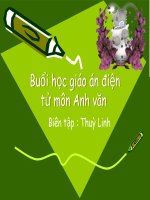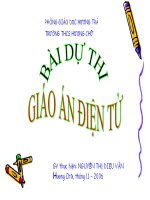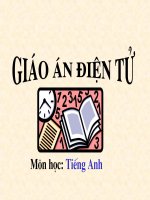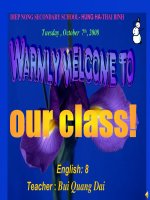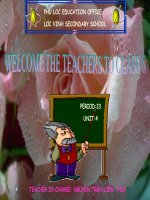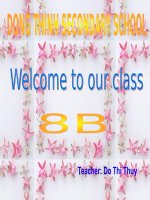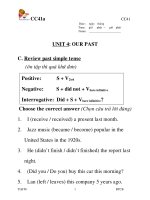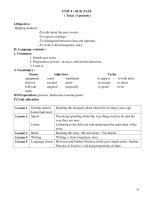Unit 4 Our past-Tiếng anh 8
Bạn đang xem bản rút gọn của tài liệu. Xem và tải ngay bản đầy đủ của tài liệu tại đây (176.63 KB, 16 trang )
UNIT 4 : OUR PAST
( Total : 5 periods )
I.Objective :
Helping students :
-To talk about the past events .
-To express feelings .
-To distinguish between facts and opinions .
-To write a short imaginary story .
II. Language contents :
1. Grammar:
1. Simple past tense .
2. Prepositions of time : in,on,at ,after,before,between .
3. Used to .
2. Vocabulary :
Nouns Adjectives Verbs
equipment cruel traditional to appear to look after
festival excited upset to escape to shout
folk tale magical magically to graze to tie
mark
III.Preparation: pictures ,flashcards,cassette,poster
IV.Unit allocation
Lesson 1
Getting started
Listen and read
Reading the dialogue about about life of many years ago
Lesson 2
Speak Practicing speaking about the way things used to be and the
way they are now.
Listen Listening to the folk tale and understand the main idea of the
story
Lesson 3
Read Reading the story “the lost shoes “ for details
Lesson 4
Writing Writing a short imaginary story .
Lesson 5
Language forcus Revision and Further Practice in the past simple tense. Further
Practice in Used to + inf and prepositions of time .
47
Week: 7
th
Preparing Day: 28/9/2013
Period: 21
th
Teaching Day: 3/10/2013
UNIT 4 OUR PAST
Lesson 1 GETTING STARTED & LISTEN AND READ
I. Objectives :
By the end of the lesson, students will be able to tell the activities people used to do in the
past .
1. Educational aims: Students are able to talk about their past. They are proud of their
traditional customs.
2. Teaching aims: Reading the dialogue about the life of many years ago.
II. Language contents :
1. Vocabulary: (n) equipment, folktale, great-grandma, tradition
(adj) traditional
2. Grammar: - Structure: + What . . . . . like ?
+ used to . . . . . .
III. Techniques: Eliciting, True / False
IV. Teaching aids: pictures, cassette, sub board
V. Procedures:
1. Warm-up: Using the picture and list of
things which don’t belong to the past.
Eg: lighting fixture, mobile phone, TV,
stereo.
2. Presentation :
-Introduce the dialogue by picture and eliciting
questions.
“Who is this ?”. “What did Nga’s grandma do
when she was young?”
-Present new words and structure:
New words:
equipment (n)
folktale (n)
light (v) → lit (past)
great-grandma (n)
tradition (n) → traditional (adj)
look after (v) = take care of (v)
Structure:
What . . . . . like ?
Used to + V-infinitive
-True / False prediction : (subboard)
a. Nga’s grandma went to school when she
was young.
b. She used to watch TV in the evening.
- Play a game
- Work in three groups, go to the board and
write. Which group write more things is winner.
-Answer
-Guess
-Copy the new words
-Role-play
-Read and check
-Work in pairs
-Individuals
48
c. She cooked the meals and washed clothes
-Present new words and structures
-Ask Ss to read the statements and predict they
are true or false.
3. Practice :
-Ask students to read the dialogue between
Nga and her grandma and check their
prediction .
-Give feedback.
a. F (Grandma used to live on a farm)
b. T
c. F ( She had a hard life ).
d. T
e. ( It is an old folk tale )
-Get Ss to work in pairs ,asking nd answering
questions.
-Give feedback.
a. She used to live on a farm .
b. Because she had to stay at home and help her
Mom to look after her younger brothers and
sisters .
c. She used to cook the meals, clean the house
and wash the clothes
d. Her great grandma used to lit the lamp and
her great grand father used to tell stories .
She ask ed her grandma to tell her the tale “
The Lost Shoes “
4. Production :
* Explain “Fact” and “Opinion”
* Do model
* Make correction
a. F b.F c. F d. f e. O f. O
5. Homework :
-Write 5 sentences about your habits in the
past.
-Do exercises 1,2 (Page 27) in Workbook.
-Prepare the part : Speak
-Do -Exercise 1 (Page :39)
- To read the dialogue between Nga and her
grandma and check their prediction
Check True or False
-Work in pairs .
-Question and answer (Exercise 2)
-Read the statements part 3 on page 39 and
decide which is a fact and which is an opinion .
VI. COMMENTS:
&
Week: 8
th
Preparing Day: 5/10/2013
49
Period: 22
nd
t
Teaching Day: 7/10/2013
UNIT 4 OUR PAST
Lesson 2 SPEAK
I. Objectives:
-Students can talk about their past, about the things used to be and the way they are now
-By the end of the lesson, students will be able to use “USED TO” talk about the things
they used to do
II. Language contents:
1. Vocabulary :
2. Grammar: - used to + V-inf
III. Techniques: Brainstorming, eliciting
IV. Teaching aids
picture, cassette
V. Procedures:
Teacher’s activities
*1. Warm up:
-Use the pictures of a person in the past and now.
-Ask questions : What do you think of the picture ?
(in the past and now)
-Have Students find out many changes of this
person (Group work)
Introduction : A person has many changes from the
past up to now : face, lifestyle everything can
change. So today we are going to learn Unit 4. . . . .
2 .Pre-Speaking : Brainstorming
*What do you think about our life nowadays?
*Is it comfortable?
*Can you imagine the life of our great grandfather?
*Did they have a TV or Mobile Phone?
-T writes some sentences using “used to . . . “ on
the board to emphasize the structure.
*In the past, People used to live in small houses.
*In the past, people didn’t use to have a TV set.
*Did they use to have a TV set?
-Hang the pictures in the Textbook.
-Ask some questions :
*What do you think about these people?
*How did they travel?
*Where did they live ?
-Have Students work in groups to find out many
changes as possible from the pictures.
Students’ activities
-Listen to the teacher
Answer:
*Our life is very comfortable
*The life of our great grandfather was very
hard.
*No, they didn’t.
-Work in groups
50
3. While-Speaking :
-Have Students talk about the changes.
-Encourage Students to find out many changes as
possible.
Possible Answer :
* People used to live in small houses. Now people
live in big houses and buildings
* People used to walk on travel. Now they can
travel by bike or car.
* There wasn’t any electricity in the past. Now,
there is electricity everywhere.
* People used to work hard all the time. Now, they
have a lot of time for entertainment.
* Children used to stay home. Now, they go to
school. . . .
-Take note the mistakes and correct.
4. Post-Speaking :
-Tell the things Students to do last year.
Eg: Last year, I used to walk to school, but now I
go to school by bicycle. . . .
-Check and correct.
5. Homework :
Do exercises 3, 4, 5 (Page 28, 29) in Workbook
Prepare Unit 4: Listen &Language focus.
-Individuals
-Work in pairs
VI. Comments:
&
Week: 8
th
Preparing Day: 5/10/2013
Period: 23
rd
Teaching Day: 8/10/2013
51
UNIT 4 OUR PAST
Lesson 3 READ
I. Objectives :
1. Educational aims :
- Students barn the lesson:” A good person will have a happy life”
- Students are able to barn moral lessons from folktales.
2. Teaching aims :
By the end of the lesson, students will be able to understand the main idea of the story by
listening, developing listening skill (finding out the main idea and Moral lesson
- Students will be able to understand and retell the story “The Lost Shoe “
II. Language contents :
1. Vocabulary : (v) lay -> laid, (adj) foolish, greedy, (n) harvest festival, broken heart,
prince, fairy, rag, (adj) upset, (v) drop, fit, fall in love
2. Grammar : - Simple Past Tense
III. Techniques :
Eliciting, Questions and Answers, Retell, Find someone who . . . . . , brainstorm
IV. Teaching aids: computer, cassette
V. Procedures :
Teacher’s activities
A: READ
1. Warm-Up : Eliciting questions:
-Do you like folktales?
-Can you tell me the names of some stories ?
2 .Pre-reading :
-Introduce : ‘Today, we are going to read one of
the folktales’
-Look at the title, have students find out the
name of this story in Vietnamese
-Have Students read through the story and tell ‘
Who was Little Pea ?’
‘Who was Stout Nut ?’
‘Whose shoe was lost?’
-Supply the new words :
* broken heart (n)
* harvest festival (n)
* fairy (n)
* rag (n)
-Have Students guess the meanings of the rest.
3. While-reading :
-Have students read the story in silent.
-Have students do practice 1 (P.42)
Students’ activites
- Answer the questions
- Listen
-Scan the story and answer:
Little Pea was Tam
Stout Nut was Cam
The lost shoe belonged to Tam.
-Copy the new words
-Silent reading
- Group work
52
*Answer Key:
a. farmer d. marry
b. died e. new clothes
c. had – again f. lost
-Have students do practice 2 (P.42)
Answer the questions.
*Answers :
a. She was a poor farmer’s daughter.
b. She made Little Pea do the chores all day.
c. Before the festival started, a fairy appeared
and magically changed her rags into beautiful
clothes.
d. The shoe fitted Little Pea.
e. No, it isn’t. Because there is a fairy.
4. Post-reading :
-Rearrange the story (Sub board)
a. Her father died of a broken heart 3
b. Little Pea was a daughter of a poor farmer 1
c. Little Pea didn’t have new clothes for the
harvest festival 4
d. Her step-mother was very cruel to her 2
e. She lost her shoe at the festival 6
f. She had her beautiful clothes magically 5
g. The prince fell in love with Little Pea 8
h. The prince wanted to marry the shoe owner
7
B. LISTEN
1. Pre-Listening :
-Brainstorming by questions:
* Do you always read folktales ?
* Which folktales do you like best ?
* What do you learn from that story ?
-Introduce the topic: “We are going to listen to
one of those stories”.
-Ask some questions:
Have you ever seen the gold eggs?
Do you like cartoon “Tom and Jerry” ?
→ Moral Lesson
Vocabulary:
* lay (v) → laid greedy (adj)
* foolish (adj) * collect (v)
* in amazement
- Work in pairs
- Work in groups
Answer :
a. Yes, I do.
b. I like Tam Cam story best.
c. Don’t be cruel to someone.
-Listen
-Answer
-Listen and repeat new words
53
-Have Students listen and decide which of the
following is the most suitable moral lesson.
a. Don’t kill chickens
b. Don’t be foolish and greedy.
c. Be happy with what you have.
d. It’s difficult to find gold.
2. While-Listening :
-Play the tape (3 times)
-Have Students tell the main idea of the story
according to their understandings.
-T summarizes and gives the answer.
“ Don’t be foolish and greedy”
3. Post-Listening :
-Story telling
Have Students tell a story according to their
understandings: (Students can use their own
words or phrases)
-Call some presentations to tell their stories.
*Content of listening
Once a poor farmer lived a comfortable life
with his family. His chickens laid many eggs
which the farmer used to buy food and clothing
for his family.
One day, he went to collect the eggs and
discorved one of the chickes laid a gold eggs.
He shouted excitedly to his wife,”We’re rich!
We ‘re rich!”
His wife ran to him and they both looked the
egg in amazement. The wife wanted more, so
her husband decided to cut open all the
chickens and find more gold eggs.
Unfortunately he couldn’t find any eggs. When
he finished all the chickens were dead.
There were no more eggs of any kind for the
foolish farmer and his greedy wife
6. Homework :
-Tell a story
-Do exercises 5, 6 (Page 29,30) in WB
-Prepare Unit 4 Write
-Read the lessons
-Listen and choose the suitable moral lesson.
-Groups of 6
VI. Comments:
……………………………………………………………………………………………………………………………………………………………………………
Week: 8
th
Preparing Day: 05/10/2013
Period: 24
th
Teaching day : 10/10/2013
54
CORRECTING TEST 1
I. OBJECTIVES :
-Correcting some mistakes which students have done, explaining what most students didn’t do
well such as rewrite the sentences, finding out words learned . . .
II.COMMENTS :
1.Comment on the students’ result
Class Sts
Pron Vocabulary and Grammar
Speaking
Reading
Writing
Transfor Guided
1 2 3 4 5 6 7 8 9 10 11 12 13 14 15 16 1 2 3 4 5 6 1 2 3 1 2 1 2 3 4
8A1
26
15 12 15 15 12 16 15 13 15 13 16 17 18 18 12 11 6 5 4 4 1 3 14 22 12
18 0 9 8
8 5
8A2
25
21 18 19 20 23 24 20 23 22 23 25 23 21 22 20 18 12 12 9 13 10 11 23 25 22 24 2 21 21 21 20
8A3
25
14 9 18 16 19 13 13 16 12 18 21 15 17 14 14 9 5 7 2 4 3 2 14 21 12 19 0 10 6 9 4
Total
76 50 39 52 51 54 53 48 52 49 54 52 55 56 54 46 38 23 24 15 21 14 16 51 68 46 61 2 40 35 38 29
2. Comment on theme of the test :
The test is suitable for the students’ knowledge. There are three requirements in the
test : recognization, understanding and application,they are suitable for three types of the
students : poor students, fair students and good students.
3. Comment on teacher’s teaching:
Teacher helped students revise the knowledge from unit 1 to unit 3 carefully. Teacher
guided students how to learn and to remember the grammar structures, vocabulaty effectively.
The teacher gave a lot of exercises for students to practice . However, students didn’t pay
attention to studying. They didn’t revise the old lesson before doing the test, so their result is
not good.
III. PROCEDURES
1. Giving the test for all the students:
Teacher: give the test for all the students
Students : see their tests carefully and recognize their mistakes
2. Correcting the test :
THEME 1
A. PRONUNCIATION
*Choos the word that has the underlined part pronunced differently from others .
1. B 2. A
B. VOCABULARY AND GRAMMAR.
*.Choose the most suitable word or phrase to fill in the blanks.
3. B 4. D 5.C 6.B 7.A 8.C
9. D 10.D 11.C 12.B 13.D 14.D
C. SPEAKING
*Choose the most suitable word or phrase to fill in the blanks.
15. A 16. B
C.READING
I. Reading the following passage and choose the best answer for each blank.
1. D 2.B 3. D 4. A 5. C 6. C
II.Reading the passage below and choose one correct answer for each question.
55
1. He invented the telephone in 1876
2. He moved to Canada when he was twenty-three/ he moved to Canada in 1870
3. Yes, he did.
E. WRITING
I. Complete each of the following sentences in such a way that it has the same meaning as the
sentences printed before it
1. Peter is good enough to answer the questions.
2. He ought to study hard.
II. Complete the sentences with the words provided .
1.There is a desk on the left of the room.
2. On the desk, there are many folders .
3. Next to the desk is the bed.
4. On the other side of the room, there is a window.
THEME 2
A.READING
I. Reading the following passage and choose the best answer for each blank.
1. D 2.B 3. D 4. A 5. C 6. C
II.Reading the passage below and choose one correct answer for each question.
1. He invented the telephone in 1876
2. He moved to Canada when he was twenty-three/ he moved to Canada in 1870
3. Yes, he did.
B. VOCABULARY AND GRAMMAR.
*.Choose the most suitable word or phrase to fill in the blanks.
1. B 2. D 3.C 4.B 5.A 6.C
7. D 8.D 9.C 10.B 11.D 12.D
C. SPEAKING
*Choose the most suitable word or phrase to fill in the blanks.
13. A 14. B
D. PRONUNCIATION
*Choos the word that has the underlined part pronunced differently from others .
15. B 16. A
E. WRITING
I. Complete each of the following sentences in such a way that it has the same meaning as the
sentences printed before it .
1. Peter is good enough to answer the questions.
2. He ought to study hard.
II. Complete the sentences with the words provided .
1.There is a desk on the left of the room.
2. On the desk, there are many folders .
3. Next to the desk is the bed.
4. On the other side of the room, there is a window.
IV. RESULT
Lôùp Toång Ñieåm >= 5 Ñieåm 8 - 10 Ñieåm < 5 Ñieåm 0 - 3
56
soá
SL % SL % SL % SL %
8A1
26
15 57.7 1 3.8 11 42.3 2 7.7
8A2
25
24 96 6 24 1 4 0 0
8A3
25
13 52 2 8 12 48 2 8
THE FIFTEEN – MINUTE TEST
SKILL : LISTENING
I. Listening to the tape and answer true or false (2,5points):
1. ………………… The farmer raised a lot of chickens.
2. . ………………….His chickens laid many gold eggs.
3. . ………………….His wife didn’t want him to cut open their chickens.
4. . ………………….He cut open all the chickens.
5. . ………………….He couldn’t find any eggs .
II.Listen and choose the best answer to complete the passage (2,5points):
1. The farmers bought the eggs to buy ………………… for his family
A. food B. clothing C. house D. A & B are correct
2. He shouted ………………… to his wife ,”We’re rich! We ‘re rich!”
A. excitedly B. carefully C. magically D. beautifully
3. They looked that egg …………………………. amazement.
A. on B. with C. in D. of
4. The farmer ……………………………. to cut all the chicken.
A. looked B. decided C. stopped D. designed
5. What did his wife wanted him to do after she saw a golden egg ?
A. He cut open all the chickens. B. He continued to find the golden eggs.
C. He stopped raising the chickens. D. He bought the golden egg.
III. Listen to tape and put the sentences in the correct order(5.0 points):
1.………………a. He killed all the chickens.
2.………………b. His wanted to have more golden eggs.
3.………………c. Once day a famer and his family lived a comfortable life.
4.………………d. There were not any eggs for the foolish farmer and his greedy wife
5. e. He saw a golden egg.
*ANSWER KEYS
I. (2,5 points)/ (0.5point/ 1 sentence):
1. T 2. F 3. F 4. T 5. T
II. (2,5 points)/ (0.5point/ 1 sentence):
1. D 2. A 3. C 4. B 5. A
III. (5.0 points)/ (1.0 point/ 1 sentence):
1. c 2. e 3. b 4. a 5. d
* The content of listening
Once a poor farmer lived a comfortable life with his family. His chickens laid many eggs which
the farmer used to buy food and clothing for his family.
One day, he went to collect the eggs and discorved one of the chickens laid a gold egg. He
shouted excitedly to his wife,”We’re rich! We ‘re rich!”
His wife ran to him and they both looked the egg in amazement. The wife wanted more, so her
husband decided to cut open all the chickens and find more gold eggs. Unfortunately he
couldn’t find any eggs. When he finished all the chickens were dead.
57
There were no more eggs of any kind for the foolish farmer and his greedy wife
IV. RESULT
Lôùp
Toång
soá
Ñieåm >= 5 Ñieåm 8 - 10 Ñieåm < 5 Ñieåm 0 - 3
SL % SL % SL % SL %
8A1
26
8A2
25
8A3
25
V. HOMEWORK:
-Prepare Unit 4: Write
VI. COMMENT:
………………………………………………………………………………………………………
………………………………………………………………………………………………………
………………………………………………………………………………………………………
………………………………………………………………………………………………………
Week: 9
th
Preparing Day: 11/10/2013
Period: 25
th
Teaching Day: 14/10/2013
UNIT 4 OUR PAST
58
Lesson 4 WRITE
I. Objectives:
1. Educational aims:
Students can know the wisdom of man.
2. Teaching aims:
Writing a short imaginary story. By the end of the lesson, Students will be able to use the
simple past tense to write a folktale.
II. Language contents:
1. Vocabulary: stripes, master, wisdom, straw
2. Grammar: - Simple Past Tense
III. Techniques:
Gap-filling, transformation writing.
IV. Teaching aids: Sub board, pictures
V. Procedures :
Teacher’s activities
1. Warm-up:
-Ask students to tell the story ‘Tri Khon Cua Ta Day ‘
2. Pre-Writing:
-Use pictures to introduce some new words.
Stripe wisdom
master straw
-Have students repeat the vocabulary.
-Have students read the story (1/P43) and complete it by
filling the verbs in the correct blank.
-Call Students to complete the story.
-Give the answer:
1 .appeared 6. tied
2. was 7. lit
3. said 8. burned
4. left 9. escaped
5. went
-Emphasize some main verbs in the simple past tense.
-ask them to work in pair and answer the questions.
a. where was the man?
b. What did the buffalo do when the tiger appeared?
c. What did the tiger want to know?
d. What did he do before gong home? Why?
e. What did he do when he returned?
3. While-writing :
-Have Students imagine that they are the farmer. Use the
words to write the story.
Students’ activities
- Look at the pictures.
- Read the new words by group or
individual.
-Read the story and complete it by
filling.
- Work in four groups
a. He was in his field.
b. It grazed nearby.
c. The tiger wanted to know why the
strong buffalo was the servant and
the small man was the master.
d. he tied the tiger to a tree with
rope because he didn’t want it to
eat the buffalo.
e. When he returned, he lit the
59
-Guide students transform the words when writing:
Eg: (Sub board)
In the story in your imagination
The man I
His my
-Take some writings to correct in front of the class
-Give feed back.
One day, as I was in a field and my buffalo grazed nearby ,a
tiger came. It asked why the strong buffalo was the servant
and I was the master. I told the tiger that I had something
called wisdom. The tiger want to see it but I said that I left the
wisdom at home that day. Then I tied the tiger to a tree with a
rope because I didn’t want it to eat my buffalo. I went to get
some straw and I burned the tiger. The tiger escaped, but
today it still has black stripes from the burn.
4. Post – writing :
Divide the class into 2 teams to retell the story Then cross –
check with their partners and correct mistakes.
-Ask a volunteer from each team to tell the story in front of
the class .
5. Homework:
Write to retell the folktale which you read or learnt .
-prepare: Unit 4. Language focus.
straw to burn the tiger.
- Write the story.
- Work in groups
-Listen to the teacher’s guiding to
write
-Change the subjects
-write individual ,then
-Retell the story.
VI. Comments:
Week: 9
th
Preparing Day: 21/10/2012
Period: 26
th
Teaching Day: 25/10/2012
UNIT 4 OUR PAST
Lesson 4 LANGUAGE FOCUS
60
I. Objectives:
1. Educational aims:
2. Teaching aims:
At the end of the lesson, students can know how to use:
• Past simple
• Prepositions of time: in, on, at, after, before, between.
• Used to
II. Language contents:
1. Vocabulary:
2. Grammar:
• Past simple
• Prepositions of time: in, on, at, after, before, between.
• Used to
III. Techniques:
Gap-filling, Eliciting, ask and answer,
IV. Teaching aids: Sub board, pictures
V. Procedures :
Teacher’s activities Students’ activities
1. Warm up.
* Matching
Infinities Past form
Fly
Take
Go
Have
Do
Be
Ride
Eat
Sit
come
Did
Rode
Sat
Flew
Took
Came
Was/ were
Ate
Went
Had
Activities 1. Simple past tense.
2. Complete the dialogue below.
- Have students work in pairs, ask and answer
the questions.
- Call some students to read and write on the
board.
- Correct
- Work in two groups
- Matching
- Work in pairs
* Answers.
a) Lan: Did you eat rice for breakfast?
Nga: No. I ate noodles.
b) Ba: How did you get to school?
Nam: I rode a bicycle to school.
c) Minh: Where were you yesterday?
Hoa: I was at home.
d) Chi: Which subject did you have
yesterday?
61
Activities 2: Prepositions of time: in on at, …
2. Complete the sentences. Use the
prepositions in the table.
- Have students look at the table.
- T explains the prepositions: in, on, at, after,
before, between,
- Have students fill the prepositions in blanks.
- Correct.
* Activities 3: used to
4. Complete the dialogue.
- Have students work in pairs, look at the
pictures and verbs in the box.
- Have students use: used to + verbs in the
box to complete the sentences.
- Call some students to read.
- Listen and correct.
Activities 4:
Write five sentences about your family, using
used to + V(inf).
Ex: My father used to smoke.
* Homework:
- Learn structures by heart.
- Prepare Unit 5: Getting started + listen and
read.
Ba: I had math.
* Answer.
a) … on …
b) … in …
c) … between …
d) … at … after …
e) … before …
- Work in pairs.
* Answers.
Hoa: … (1) … used to have …
Hoa: … (2) … used to be …
Hoa: … (3) … used to live …
- Write sentences.
-
VI. Comments:
62
